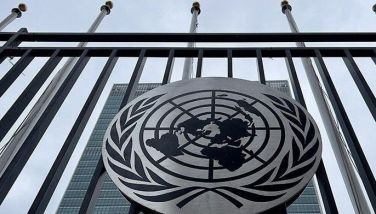Mormon leaders call for measures protecting gay rights
SALT LAKE CITY — Mormon church leaders are making a national appeal for a "balanced approach" in the clash between gay rights and religious freedom.
The church is promising to support some housing and job protections for gays and lesbians in exchange for legal protections for believers who object to the behavior of others.
It's not clear how much common ground the Mormons will find with this new campaign. The church insists it is making no changes in doctrine, and still believes it's against the law of God to have sex outside marriage between a man and a woman.
But church leaders who held a rare news conference yesterday said "we must all learn to live with others who do not share the same beliefs or values."
The language of the new campaign mirrors a website the church launched in 2012 instructing Latter-day Saints to be more accepting and compassionate toward gays. The church made clear then and now that it still opposes gay marriage and insists on its right to apply its own rules within church-affiliated charities, schools, businesses and properties, even those that provide services to non-Mormons.
The church announced the campaign in a rare news conference including three elders from a high-level Mormon governing body called the Quorum of the Twelve Apostles.
Church leaders condemned discrimination against gays in stark terms, speaking of centuries of "persecution and even violence against homosexuals."
"Ultimately, most of society recognized that such treatment was simply wrong, and that such basic human rights as securing a job or a place to live should not depend on a person's sexual orientation," said Neill Marriott, a member of the church's Public Affairs Committee.
Mormon leaders still want to be able to hire and fire workers based not only on religious beliefs, but also on behavior standards known as honor codes. Gays and lesbians would have to agree to remain celibate or marry someone of the opposite sex. The church also wants legal protections for religious objectors who work in government and health care, such as a physician who refuses to perform artificial insemination for a lesbian couple.
Accommodations for religious objectors have factored into every state legislative debate over gay rights. But political pressure on rights groups to make concessions to religious conservatives is plummeting as support for same-sex marriage grows around the country.
Gay rights advocates say broad religious exemptions perpetuate discrimination. In some states, such as Arizona, business leaders now side with gay advocates, saying extensive religious exemptions hurt a state's image.
When the US Supreme Court set a broad expansion of gay marriage in motion last year, religious conservatives said they would press states to allow some groups, companies and people to refuse some benefits or service for gay spouses. And gay rights groups seeking job and housing protections have faced an uphill battle in the more politically and religiously conservative states. Under these circumstances, advocates for broader religious exceptions believe they can win some concessions.
The Mormon church operates an extensive network of charities, schools and for-profit businesses around the country, with total operating budgets in the billions of dollars, but the new LDS approach is likely to be especially significant in the Mormon strongholds of Utah, Idaho, Nevada and Arizona, where the church and its members play a large civic role.
After coming under intense criticism for leading the fight for California's Proposition 8, church leaders have been trying to heal tensions by telling Latter-day Saints to be more loving and respectful toward gays and lesbians, while appealing to gay and lesbian Mormons to stay in the church.
"Accommodating the rights of all people — including their religious rights — requires wisdom and judgment, compassion and fairness," Holland said. "Politically, it certainly requires dedication to the highest level of statesmanship. Nothing is achieved if either side resorts to bullying, political point scoring or accusations of bigotry."
- Latest
- Trending

































